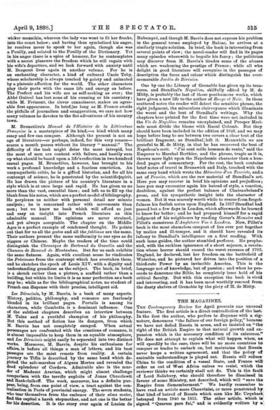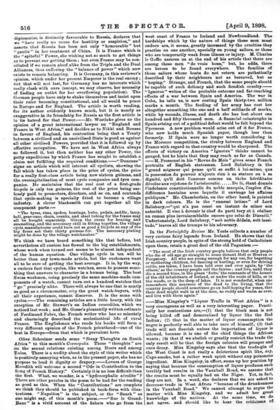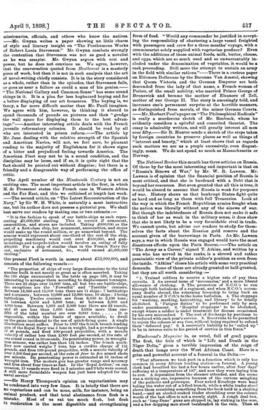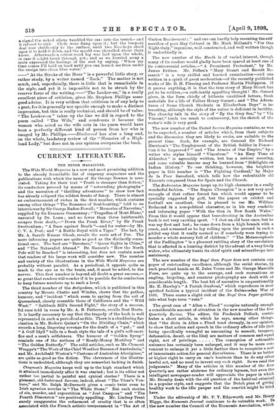THE MAGAZINES.
THE Contemporary Review for April presents one unusual feature. The first article is a direct contradiction of the last. In the first the author, who prefers to dispense with a sig- nature, denounces "the failure of our foreign policy," because we have not defied Russia in arms, and so insisted on "the right of the British Empire to that natural growth and ex- pansion which is the necessary condition of its existence." He does not attempt to explain what will happen when, as will speedily be the case, there will be no more countries to conquer or trades to embark on, but maintains that Russia never keeps a written agreement, and that the policy of amicable understandings is played out. Russia will reduce China to the condition of a vassal State, and France will order us out of West Africa unless we resist, which the reviewer thinks we certainly shall not do. This is the fault of Lord Salisbury, who should therefore be dismissed in favour of some Ministry, not described, which will "save the Empire from dismemberment." We hardly remember to have read an article more Chauvinist, or more penetrated by that kind of hatred of Russia which men like Mr. Urquhart betrayed from 1840 to 1855. The other article, which in signed "Quorum pars fui," and is evidently written by a': diplomatist, is distinctly favourable to Russia, declares that we "have really no cause for hostility or suspicion," and asserts that Russia has been not only "honourable" but " gentle " in her treatment of China. It is France which is the " spitef ul " Power, she wishing not so much to get things
as to prevent our getting them ; but even France may be con- ciliated if we remain aloof alike from the Triple and the Dual Alliances, thus suffering the "balance of power" which now exists to remain balancing. It is Germany, in this reviewer's opinion, which under her present Emperor is the real enemy ; but that will not last, for Germany has no interests which really clash with ours (except, we may observe, her necessity of finding an outlet for her overflowing population). The German people have only to shake themselves and insist upon their ruler becoming constitutional, and all would be peace in Europe and for England. The article is worth reading, for its author evidently knows much, but it is nearly as exaggerative in its friendship for Russia as the first article is in its hatred for that Power.—Mr. Westlake gives us the opinion of a great international lawyer on "England and France in West Africa," and decides as to Nikki and Boussa in favour of England, his contention being that a Treaty between a civilised and an uncivilised State is good as against all other civilised Powers, provided that it is followed up by effective occupation. We have not in West Africa always so followed it, but then neither has any other Power, the petty expeditions by which France has sought to establish a claim not fulfilling the required conditions.—"Duncans" signs an article which will interest all cyclists, showing the fall which has taken place in the price of cycles, the price for a really first-class article being now sixteen guineas, and the overcapitalisation of most cycle companies and tyre com- panies. He maintains that the real cost of a first-grade
bicycle is only ten guineas, the rest of the price being use- lessly paid to promoters, directors, and so on, and contends
that cycle-making is specially fitted to become a village industry. A clever blacksmith can put together all the component parts:—
" The tyres, rims, spokes, bearings, hubs, pedals, saddle, lamp, bell, gear-case, chain, cranks, and steel tubing for the frame may all be bought separately. Given the ovens for brazing and enamelling, and the necessary skill in fitting together, the village cycle manufacturer could turn out as good a bicycle as any of the big firms ask their thirty guineas for. The necessary plating might be done by the village watchmaker."
We think we have heard something like that before, but nevertheless all custom has flowed to the big establishments, whose work when turned out seems to be almost independent of the human equation. One village cycle in ten will be better than any town-made article, but the customers want all to be sure of getting the best average. It is, by the way, a curious fact that cycles, like watches, seem to possess some- thing that answers to character in a human being. The best Swiss workmen, using precisely the same machine-made com- ponents of a watch, cannot turn out a hundred watches that " go " precisely alike. There will always be one that is nearly as good as a chronometer, why the great watch-buyers, with all their experience, cannot discover. It is the same with cycles.—The remaining articles are a little heavy, with the exception of Mr. Stewart's on Indian crocodiles, which we noticed last week ; and Mr. Gosse's pleasantly written estimate of Ferdinand Fabre, the Frenoh writer who has so minutely and charmingly described the ecclesiastical life of rural France. The Englishman who reads his books will form a very different opinion of the French priesthood—one of the best in Europe—from that which is prevalent here.
Olive Schreiner sends some "Stray Thoughts on South Africa" to this month's Connopolis. These " thoughts " are on the sexual relations existing among Boers and among Zulus. There is a nudity about the style of this writer which is positively annoying when, as in the present paper, she has no purpose to lend it dignity or drapery.—Lovers of George Meredith will welcome a second "Ode in Contribution to the Song of French History." Certainly it is no less difficult than the first. What, we wonder, is a "hydrocephalic aerolite" ? There are other puzzles in the poem to be had for the reading as good as this. When the " Contributions " are complete we think they should be published in book-form with illus- trations. "Napoleon" is the subject, or the " Snark " as one might say, of this month's poem.—" Sur le Grand-
Basic" is a vivid account of the fishers who go from the west coast of France to Iceland and Newfoundland. The hardships which by the nature of things these men must endure are, it seems, greatly increased by the cruelties they practise on one another, specially on young Bailors, or those who are temporarily weak from illness or injury. M. Charles le Goffic assures us at the end of his article that there are among these men "de vrais bons," but, he adds, there are heroes to be found everywhere. The families of those sailors whose boats do not return are pathetically described by their neighbours not as bereaved, but as "hoping." Strange, and French, that the same people should be capable of such delicacy and such fiendish cruelty.— " Ignotus " writes of the probable outcome and far-reaching effects of a war between Spain and America. The war in Cuba, he tells us, is now costing Spain thirty-two million marks a month. The feeding of her army has cost her altogether something like one and a half milliards of marks, while by wounds, illness, and death she has lost about one hundred and fifty thousand men. A financial catastrophe in Spain arising out of a political defeat would be felt beyond the Pyrenees. A new problem would arise out of it for France, who now holds much Spanish paper, though less than formerly. If Spain were no longer worth considering in the Morocco competition, the rivalry between England and France with regard to that country would be sharpened. The effects of victory on America "Ignotua " thinks cannot be ganged, but he hints that they may reach as far as Canada. —M. Pressense in his "Revue du Idols" gives some French portraits of English statesmen. Lord Salisbury is the "grand seigneur qui pense qu'il se suffit a lui-meme, qua la possession du ponvoir n'ajoute rien a sa stature on a sa
dignite, doit l'exercer comme un ttiche hereditaire devolue aux rejetons de l'aristocratie Be la, etant donnee l'indolence constitutionnelle du noble marquis, l'espece d'in- difference hautaine avec laquelle U envisage les affairea publiques." Mr. Chamberlain, on the other hand, is painted in dark colours. He is the " ennemi intime" of Lord Salisbury,—" qui n'a pas cease an instant de miner son autorite. D vise a devenir le chef da parti tory et a realiser un roman plus invraisemblable encore pie celai de Disraeli." Unfortunately, Lord Salisbury, " Boit noble dedain, soit lassi- tude," leaves all the trumps to his adversary.
In the Fortnightly Review Mr. Yeats collects a number of very curious fairy legends from Ireland. He shows that the Irish country people, in spite of the strong hold of Catholicism upon them, retain a great deal of the old Paganism
:- "The most of the Irish country people believe that only people who die of old age go straight to some distant Hell or Heaven or Purgatory. All who are young enough for any use, for begetting or mothering children, for dancing or hurling, or even for driving cattle, are taken, I have been told over and over again, by 'the others,' as the country people call the fairies ; and live, until they die a second time, in the green 'forts,' the remnants of the houses of the old inhabitants of Ireland, or under the roots of hills, or in the woods, or in the deep of lakes. It is not wonderful, when one remembers this nearness of the dead to the living, that the country people should sometimes go on half-hoping for years, that their dead might walk in at the door, as ruddy and warm as ever, and live with them again."
—Miss Kingsley's "Liquor Traffic in West Africa" is a very courageous as well as a very interesting paper. Practi- cally her contentions are,—(1) that the black man is not being killed off and demoralised by liquor like the Red Indian; (2) that in the matter of liquor consumption the negro is perfectly well able to take care of himself ; (3) that trade will not flourish unless the importation of liquor is allowed, because it is one of the chief things the African wants; (4) that if we abolish or greatly restrict the trade the only result will be that the foreign colonies will prosper and ours decay. Miss Kingsley says also that the trade-gin of the West Coast is not really a deleterious spirit like, say, Cape-smoke, but a rather weak spirit without any poisonous ingredient. Miss Kingsley, in effect, sums up her position by saying that because the consumption of liquor produces such terribly bad results in the Vauxhall Road, we assume that the results must be equally bad on the Niger. Yet, in fact, they are not. In a word, she declares that we are asked to decrease trade in West Africa "because of the drunkenness in the Vauxhall Road." We cannot attempt to argue the matter with Miss Kingsley, and we admit her great knowledge of the natives. At the same time, we do not agree, and should like to hear the criticisms of
missionaries, officials, and others who know the natives. —Mr. Gwynn writes a paper showing no little charm of style and literary insight on "The Posthumous Works of Robert Louis Stevenson." Mr. Gwynn combats strongly the contention that Stevenson was not as good a novelist as he was essayist. Mr. Gwynn argues with zest and power, but he does not convince us. We agree, however, that the conversation quoted from Heathercat is a masterly piece of work, but then it is not in such analysis that the art of novel-writing chiefly consists. It is in the story considered as a whole, rather than in the episodes, that Stevenson fails, -or goes as near a failure as could a man of his genius.
." The National Gallery and Common-Sense" has some sound things in it. It is a plea for less haphazard buying and for a better displaying of our art treasures. The buying is, we fancy, a far more difficult matter than Mr. Paull imagines. We agree with him, however, in thinking it absurd to spend thousands of pounds on pictures and then "grudge the wall space for displaying them to the best advan- tage."—Another interesting article deals with the French juvenile reformatory colonies. It should be read by all who are interested in prison reform.—The article by Mr. Jane dealing with the relative strength of the Spanish and American Navies, will not, we feel sure, be pleasant reading to the majority of Englishmen for it shows signs of a bitter and prejudiced feeling towards America. The American Fleet may not be in a sound condition, and the discipline may be loose, and if so, it is quite right that the fact should be pointed out without disguise ; but there is a friendly and a disagreeable way of performing the office of critic.
The April number of the Nineteenth Century is not an exciting one. The most important article is the first, in which M. de Pressense states the French case in Western Africa and the Far East, and this we criticised at length last week. —The second article, on "The Latest Reconstruction of the Navy," by Sir W. H. White, is naturally a most instructive one, but its author does not possess a pictorial pen. We shall best serve our readers by making one or two extracts :— "It is the fashion to speak of our battle-ships as each repre- senting .21,000,000 sterling. This is correct if armament, ammunition, and stores are included. Taking .£300,000 as the cost of a first-class ship, her armament, ammunition, and stores would make up the round million, or go somewhat beyond. The armour would represent about one-third of the cost of the ship, propelling machinery would cost over 2100,000, and gun- mountings and torpedo-tubes would involve an outlay of fully £80,000. For a ship of similar class in the French Navy the cost, exclusive of armament, &c., would exceed .£1,000,000 sterling."
Our present Fleet is worth in money about 252,000,000, and consists of the following vessels :— " The proportion of ships of very large dimensions to the total number built is not nearly so great as is often asserted. Taking the 190 ships enumerated in the table on page 538, it may be interesting to arrange them according to displacement tonnages. There are 22 ships over 14,000 tons, all but two are battle-ships, the exceptions are the Powerful' and 'Terrible' cruisers. Between 12,000 and 13,000 tons there are 11 ships : 7 battleships and 4 cruisers; between 10,000 and 12,000 tons, 10 ships : 2 being battleships. Twelve cruisers are from 6,500 to 9,100 tons ; 24 between 4,000 and 5,800 tons ; 46 between 2,000 and 4,000 tons. Between 1,000 and 2,000 tons there are 22 vessels, and 43 are less than 1,000 tons. Little more than one- fifth of the total number are over 9,000 tons It is impossible, within the limits of space available, to dwell on the gains incidental to the use of quick-firing guns. A single illustration must suffice. Prior to 1887 the 6-inch breech-loading gun of the Royal Navy was 5 tons in weight, had a powder-charge of 48 pounds, and fired 100-pound projectiles, with a muzzle velocity of rather less than 2,000 feet per second, at the rate of one aimed round in 50 seconds. Its penetrating power, in wrought- iron armour, was rather less than 124 inches. The 6-inch quick- firer now carried weighs 7 tons, has a cordite charge of 13/ pounds, and fires 100-pound projectiles, with a muzzle velocity of over 2,200 feet per second, at the rate of four to five aimed shots per minute. Its penetrating power is estimated at 16 inches of wrought iron. The modern gun has greater range and accuracy and fires about four times as fast. In the Royal Arthur,' on one occasion, 15 rounds were fired in 3 minutes and 9 hits were scored. A still more formidable weapon has just been adopted for the naval service."
--Sir Henry Thompson's opinion on vegetarianism may be condensed into very few lines. It is briefly that there are no vegetarians and can be none, milk, for instance, being an animal product, and that total abstinence from flesh is a mistake. Most of us eat too much flesh, but flesh L!1 moderation is the most digestible and strengthening form of food. "Would any commander be justified in accept- ing the responsibility of chartering a large vessel freighted with passengers and crew for a three months' voyage, with a
commissariat solely supplied with vegetarian produce? Even with the additions of those animal foods, milk, butter, cheese,
and eggs, which are so much used and so unwarrantably in- cluded under the denomination of vegetables, it would be a rash proceeding. Still more the attempt to sustain an army
in the field with similar rations."—There is a curious paper on Eleonore Dolbreuse by the Baronne Van Amstel, showing that Queen Victoria and the German Emperor are both descended from the lady of that name, a French woman of Poitou, of the small nobility, who married Prince George of Brunswick and became the mother of Eleanore of Zell, mother of our George II. The story is amusingly told, and increases one's permanent surprise at the horrible manners, as distinguished from morals, of the minor German Courts. Mr. Herbert Paul's paper on "The Philosophical Radicals" is really a murderous sketch of Mr. Roebuck, whom he evidently considers a spiteful and conceited theorist. The essay is admirably written, and will greatly interest all men
over fifty.—Sir R. Hunter sends a sketch of the steps taken by foreign countries to preserve places as well as things of
"interest and beauty," which at least shows that as regards such matters we are as a people excessively, even disgust.
ingly, mean. We do not spend so much as Massachusetts or Norway.
The National Review this month has three articles on Russia. Of these by far the most interesting and important is that on "Russia's Sinews of War," by Mr. W. R. Lawson. Mr. Lawson is of opinion that the financial position of Russia is most critical, and that she is burdened with a Debt that is beyond her resources. But even granted that all this is true, it would be absurd to assume that Russia is weak for purposes of war. History shows us that bankrupt States fight quite as hard and as long as those with full Treasuries. Look at the way in which the French Republican armies fought' when the nation was literally without any of the sinews of war.
But though the indebtedness of Russia does not make it safe to think of her as weak in the military sense, it does show that she is not likely to be a very formidable rival in trade. We cannot quote, but advise our readers to study for them- selves the facts about the Russian gold reserve and the account given of the borrowings in Paris. As Mr. Lawson says, a war in which Russia was engaged would have the most disastrous effects upon the Paris Bourse.—The article on " The Army as a Career," signed T. Atkins, and written by a man who has served in the ranks, is a shrewd and rathex pessimistic view of the private soldier's position as seen from the inside. "Atkins" closes his article with some very practical demands. Some of these are already granted or half-granted, but they are all worth considering :—
"1. Trained soldiers to receive a higher rate of pay than recruits. 2. An annual issue of 'necessaries,' and a more liberal allowance of clothing. 3. The promotion of N.C.O.'s to run through both battalions of a regiment, and when N.C.O.'s accom- pany drafts abroad, the returning troopship to bring back an equal number of N C.O.'s to the home battalion. 4. The stoppage for'washing, marking, haircutting, and library' to be totally abolished. 5. 'Fatigue duties' to be performed only by men under punishment. 6. Hospital stoppages' to be abolished, except where a soldier is under treatment for disease occasioned by his own misconduct 7. The cost of discharge by purchase to be reduced with each year's service. 8. Reservists to be permitted to rejoin the colours at any time, without being required to refund their deferred pay.' 9. A reservist's liability to be called up' to be in inverse ratio to his period of service in this force."
Blackwood's Magazine is, as usual, fall of good papers. The first, the title of which is "Life and Death in the Niger Delta," gives a terrible impression of the reign of
death that hangs over the West African Coast. Here is a grim and powerful account of a funeral in the Delta :—
"That afternoon we took part in a function which is only too common in every African trading station—a funeral. A young clerk had breathed his last a few hours earlier, after four days' suffering at a temperature of 107', and now they were laying him to rest. A deputation from the steamer attended, and the scene was a striking one, impressive because of the curious mingling of the pathetic and grotesque. Four naked Krooboys were lousy baling the water out of a 3-foot trench, while a white trader stothl above them mumbling something from the book held in a shaking hand,—and an alcohol-soaked trader stumbling over the solemn words of the last office is not a seemly sight. A rough deal box, such as long-Dane' guns are shipped in, lay sinking in the ooze. and a few dripping men stood bareheaded in the rain. Then at a signal tl-e naked aliens tumbled the eau into the trench—and it refused to sink. Clods were flung upon it ; but the buoyant deal rose stubbcs nly to the surface, until two Krooboys stood upon it to hold it down, and the mould was shovelled about their knees. Afterwards a cotton-wood log was laid upon the whole, in case it might break through yet ; and as we hurried away a mate expressed the feelings of the rest by saying, 'When my time comes I'll hold on hard until you can launch me from under the ensign into clean blue water.'" —" At the Stroke of the Hour" is a powerful little story, or rather study, by a writer named "Zack." The matter is not much, and, superficially, there is little that is remarkable in the style, and yet it is impossible not to be struck by the reserve force of the writing.—" The Looker-on," in a really
excellent piece of criticism, gives Mr. Stephen Phillips some good advice. It is very seldom that criticism is of any help to a poet, for it is generally not specific enough to make a distinct impression, but this is really technical, and should be of value. "The Looker-on" takes up the line we did in regard to the poem called "The Wife," and condemns it because the woman who acted as the wife acts in the poem would have been a perfectly different kind of person from her who is imaged by Mr. Phillips.—Blackwood has also a long and, on the whole, laudatory review of the "Memoirs of a High- land Lady," but does not in our opinion overpraise the book.





































 Previous page
Previous page